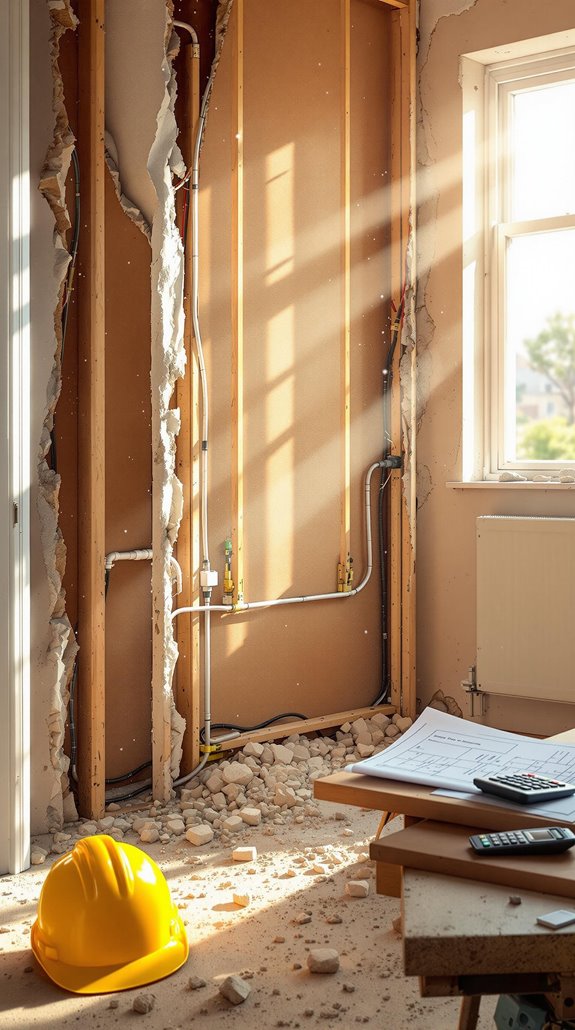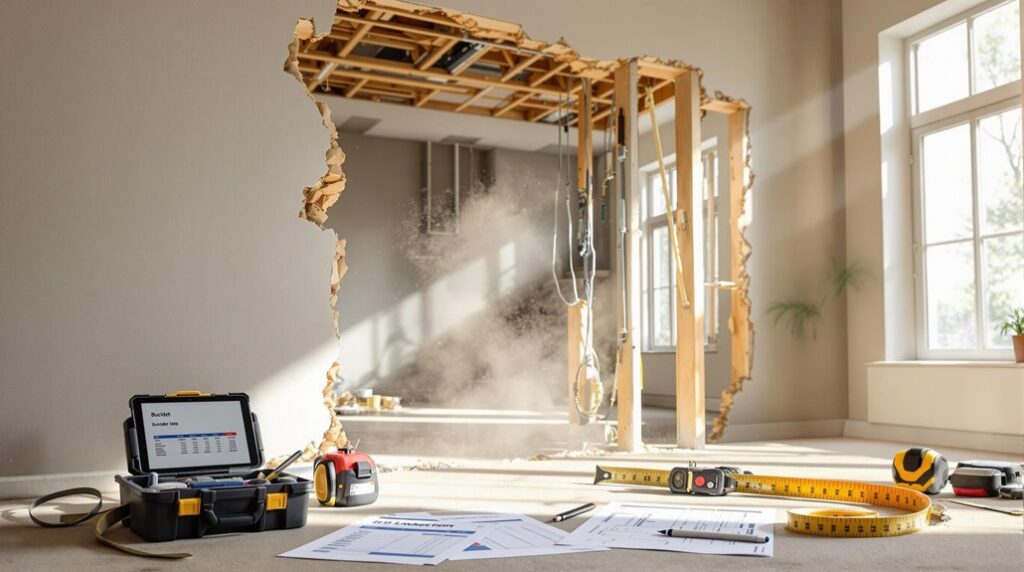I’ve seen countless homeowners get blindsided by wall demolition costs that spiral far beyond their initial estimates. What starts as a simple “$500 wall removal” can quickly balloon into thousands when you discover load-bearing requirements or hidden electrical lines. The difference between a straightforward non-load-bearing wall and a structural wall isn’t just construction complexity—it’s the gap between a weekend project budget and a major renovation expense. Let me break down what you’re really facing.
Key Takeaways
- Non-load-bearing wall removal costs $500-$3,500, while load-bearing walls range from $4,000-$15,000 depending on home structure.
- Material type significantly impacts costs: drywall ($0.30-$0.45/sq ft) versus brick/concrete ($2.90-$6.40/sq ft) for demolition.
- Structural engineering assessments cost $500-$2,000 but prevent costly surprises and ensure proper load-bearing wall identification.
- Kitchen and bathroom walls cost more ($3-$10/sq ft) due to plumbing, electrical, and tile removal complications.
- Budget an extra 30% for hidden expenses like asbestos removal ($1,000-$5,000+) and unexpected structural modifications.
Understanding Wall Demolition Costs by Material Type
When you’re planning a wall demolition project, the material type greatly impacts your overall costs. I’ve found that understanding these differences helps you budget more effectively.
Drywall runs $0.30 to $0.45 per square foot since it’s easy to cut and creates minimal mess. Plaster costs more at $0.45 to $0.75 per square foot because it’s brittle and often contains lath backing that complicates removal. Wood materials fall between $0.40 to $0.60 per square foot, depending on whether you’re removing paneling or structural studs. Brick demolition jumps considerably to $2.90 to $6.40 per square foot due to heavy labor requirements. Concrete blocks command similar high rates because they require specialized tools and create substantial debris that increases disposal costs.
Beyond the basic demolition costs, you’ll need to factor in debris removal expenses, which typically range from $15 to $50 per hour if you handle it independently.
Load-Bearing Vs Non-Load-Bearing Wall Removal Pricing
The type of wall you’re removing creates the biggest price difference in demolition projects. I’ve found that non-load-bearing walls typically cost $500 to $3,500 to remove, while load-bearing walls jump to $4,000-$10,000 for single-story homes. If you’re tackling a multi-story house, expect $9,000-$15,000 for load-bearing removal.
Here’s what drives these costs: load-bearing walls require structural engineers, temporary supports, and beam installations. You’ll also face permit fees and potential utility rerouting. Non-load-bearing walls are straightforward demolition jobs without structural concerns. Additionally, house extensions often necessitate similar considerations for structural integrity and planning.
Kitchen expansions show this gap clearly—removing a short partial load-bearing wall costs $2,250, while a full 15-foot wall reaches $6,750. The national average for 120 square feet of load-bearing removal sits at $6,760. Weather conditions significantly impact project efficiency, with summer or fall being the optimal timing for removal work.
Engineering and Structural Assessment Fees

Before you swing that sledgehammer, you’ll need a structural engineer’s stamp of approval—and that professional assessment comes with its own price tag. I’ve found that structural engineering fees typically range from $500 to $2,000 nationally, though you might pay as little as $300 or as much as $20,000 for complex projects.
Most engineers charge $100 to $200 per hour for consultations. Load-bearing wall assessments specifically cost $390 to $1,300, depending on your project’s complexity and location. Engineers also provide beam design calculations and load support analysis as part of their comprehensive structural evaluation.
Don’t view this as an optional expense—it’s crucial insurance for your project. Engineers identify structural issues early, guarantee code compliance, and provide remediation recommendations that’ll save you money down the road. Their assessment influences your entire budget and prevents costly surprises.
Room-Specific Demolition Cost Breakdowns
Location matters greatly when calculating wall demolition costs, as each room presents unique challenges that directly impact your budget.
Kitchen Wall Removal
Kitchen walls typically cost $3-8 per square foot due to plumbing and electrical lines. You’ll face higher expenses when gas lines are involved, requiring licensed professionals for safe disconnection.
Bathroom Wall Demolition
Expect $4-10 per square foot for bathroom walls containing extensive plumbing and moisture barriers. Tile removal adds $2-5 per square foot to your total.
Basement Wall Removal
Basement walls run $2-6 per square foot, though concrete or stone construction increases costs considerably. Foundation concerns require structural engineering consultation.
Living Room/Bedroom Walls
Standard drywall removal costs $1-3 per square foot in these spaces, making them the most affordable option for wall removal projects. Remember that manual demolition typically requires workers at $15 to $20 per hour each.
Load-Bearing Wall Removal
Structural walls require engineering permits and beam installation, adding $1,000-5,000 to your project regardless of location.
Hidden Expenses That Impact Your Final Budget

While your initial demolition quote might seem straightforward, unexpected expenses can quickly balloon your project budget by 25-50% or more. I’ve seen homeowners caught off-guard by hazardous materials like asbestos or lead paint, adding $1,000-$5,000+ to their costs. You’ll face specialized removal teams charging $50-$150/hour, plus disposal fees that exceed standard debris by 200-400%. Additionally, if you are planning structural changes, you may need to obtain building control approval, which can introduce further costs and delays.
Structural surprises hit hard too. Load-bearing walls require temporary supports ($1,500-$5,000), while rerouting utilities costs $500-$3,000. Don’t forget site access challenges—narrow spaces increase labor costs by 20-40%, and third-floor demolitions need crane rentals at $500-$2,000/day.
I always recommend budgeting an extra 30% contingency fund. Change orders carry 10-20% markups, and delays from material shortages can add $1,000-$5,000 weekly to your project. Professional contractors typically deliver higher efficiency rates than DIY approaches, which can help offset some unexpected costs through streamlined execution.
Conclusion
I’ve walked you through the key factors that’ll determine your wall demolition costs. Remember, you’re looking at $500-$3,500 for non-load-bearing walls and $4,000-$10,000 for load-bearing ones. Don’t forget those engineering assessments and material-specific removal requirements. Most importantly, I can’t stress enough—budget that extra 30% for surprises. You’ll thank yourself when unexpected plumbing or electrical work pops up. Plan smart, budget realistically, and your demolition project won’t break the bank.
References
- https://homeguide.com/costs/interior-demolition-cost
- https://www.178wing.ang.af.mil/Portals/69/documents/afh33-337.pdf?ver=2016-12-15-101008-313
- https://www.fixr.com/costs/remove-wall
- https://homeguide.com/costs/cost-to-remove-a-wall
- https://www.homewyse.com/services/cost_to_remove_interior_wall.html
- https://kaleidoscope.es/en/blog/how-much-it-costs-to-knock-down-a-wall-complete-guide/
- https://www.baycitiesconstruction.com/blog/how-much-does-it-cost-to-remove-a-wall
- https://www.angi.com/articles/how-much-does-it-cost-remove-wall.htm
- https://estimatorflorida.com/how-much-does-it-cost-to-remove-a-wall/
- https://forums.moneysavingexpert.com/discussion/6479849/how-much-should-i-expect-to-pay-to-knock-down-a-non-load-bearing-wall

